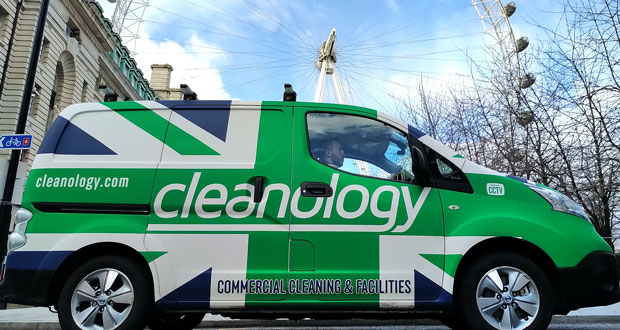 Dominic Ponniah, CEO & Co-Founder of office cleaning experts, Cleanology, sets out why a commitment to sustainability remains of paramount importance even in a time of recession.
Dominic Ponniah, CEO & Co-Founder of office cleaning experts, Cleanology, sets out why a commitment to sustainability remains of paramount importance even in a time of recession.
Despite the tough economic conditions many businesses face, sustainability remains the No. 1 priority for many of them – and that’s a positive thing.
Yes, there is a cost attached to being sustainable. But unlike in previous years, companies cannot afford ‘not’ to act responsibly, and in the interests of people and planet. Rather than being driven by a few individuals in a company, sustainability is now a non-negotiable, board agenda item. It’s part of how people do business, and investors increasingly want to see that too.
Rather than row back on their sustainability agenda, companies are finding other ways to save money, whether that’s by cutting cleaning hours or reducing the scope of cleaning contracts. They might be reducing their overall budgets, but that is not having an impact on sustainability efforts.
In London, where Cleanology pays a Real Living Wage to our people, there is a realisation that paying fairly for cleaning is the only way to get good service.
Cleanology continues to take our sustainability impacts seriously. We have advocated for chemical-free cleaning for the past decade and we’re now almost chemical-free across our entire portfolio. To tackle the issue of over-use of cleaning solutions, we developed our own portion-controlled sachets of biological cleaning solution – a move that is saving more than 16,000 litres of water each year, and has drastically cut the use of plastic bottles, from 21,600 to just 600 PET bottles.
Embracing energy-efficient technologies, such as LED lighting, electric vehicles and low-energy equipment, has substantially reduced our carbon footprint, and lowered costs. For example, our decision to switch our fleet of vehicles to fully electric is saving more than £3,000 a year per vehicle.
Sustainability is also about fostering a new culture internally. As well as being a Real Living Wage employer in an industry known for low pay, we provide free English classes and mental health support. These benefits show staff that they are valued, and that doing the right thing lies at the heart of our business.”
Our ISO 9001 and 14001 certifications call for continuous improvement, efficient record-keeping and robust monitoring, with 10 consecutive years of outstanding accreditation.
Monitoring and measuring our activities at head office and across all our sites has provided a useful tool to show us whether we are setting realistic goals, meeting those goals, and planning ahead in the right areas. We are also looking forward to securing BCorp accreditation to take us to the next level.
Our environmental policy also extends through to our supply chain, where our suppliers are rigorously scrutinised before approval to ensure they uphold our environmental objectives, and that those standards are maintained through our annual supplier audit.
We don’t see any value in partnering with companies unless they are likeminded and similarly ambitious on sustainability.
We make every effort to show a commitment to sustainability in every part of Cleanology. For example, our focus has now shifted to deal with the enormous plastic waste created by mop heads with plastic sockets. Given we use over 135,000 mop heads a year, we are now using mop heads where you only change the strings, not the plastic.
Furthermore, following a successful trial and positive staff and client feedback, we became the first cleaning company in the UK to introduce uniforms made from recycled plastic bottles. This saves 7,000 bottles from landfill each year, whilst also saving on resources and energy to manufacture new clothing.
To combat paper waste we had already seen the benefit of switching to digital with e-payslips for staff and e-billing for clients, resulting in a total saving of over 100,000 sheets of paper a year. Last year we went further with all quotes and staff inductions being issued electronically, saving a further 130,000 sheets of paper a year, not to mention the printer ink involved.
Our recycling systems are designed for maximum participation. As well as our own site audits, we use an online portal which enables us to share real-time recycling data with our clients. We also host “lunch and learn” sessions to increase engagement.
Staff receive in-depth training during induction, and also annual refresher courses. On site effectiveness depends on staff buy-in, so we hold regular ‘toolbox talks’ and aim to inspire them to improve on environmental performance. We regularly survey employees to assess their level of environmental awareness, which improved from 69 per cent in 2019 to 81 per cent last year. We aim to reach over 90 per cent next year, and plan to implement the employee survey on a more regular basis, to keep better track of environmental awareness among employees.
We now make clients aware of the environmental impact of the consumables they choose by providing carbon footprint measurement, country of origin and a sustainability star rating.
We host quarterly roundtable events engaging with clients, suppliers and industry stakeholders on key sustainability issues.
https://cleanology.com/services/office-cleaning/





